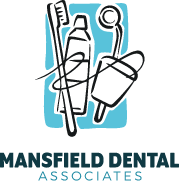Have you ever wondered why some dental fillings are white while others are silver? These white fillings are known as composite resin fillings, and the silver-like fillings are called amalgam fillings. During a dental filling procedure at Mansfield Dental Associates, Dr. S. Blair Jones and Dr. Seth Harris first remove the decay from the tooth, prepare the space for the filling by cleaning the cavity of bacteria and debris, and then apply a filling of silver amalgam or composite resin. They are highly experienced in the placement of both types of fillings. Our dentists are also dedicated to educating patients on their options, so we discuss the differences between these two.
Different Kinds of Fillings
- Silver (amalgam) dental fillings are sturdier than white fillings. Amalgam is stronger because it is made up of metals– silver, tin, copper, zinc, and mercury, to be exact. It is generally recommended for back teeth, which must withstand greater force from chewing. The composite resin material, on the other hand, is a mixture of plastic and glass materials, and are not as durable as metal amalgam.
- Amalgam fillings are less expensive than white fillings.
- Amalgam fillings last longer than composite fillings.
- White fillings are less apparent than the silver-like amalgam fillings. They can also be tinted to best match the color of your teeth.
- Amalgam fillings emanate low levels of mercury vapor that you might inhale. If a person is exposed to a significant amount of mercury vapor, it can harm the brain or kidneys. However, after reviewing the available scientific studies, the FDA has determined that silver fillings are safe for adults and children over age six. Nevertheless, if you’re pregnant or have a metal allergy, then discuss your condition with our dentists during your initial consultation.
- Amalgam fillings are held in place by the shape of a cavity. If a cavity is too small, the cavity must be widened at the base of the tooth so that the filling can hold its shape. As a result, the dentist may be forced to remove a small portion of the healthy tooth. On the other hand, a white filling conforms to the shape of the cavity, and can be used for very small cavities with greater success.
ABOUT YOUR MANSFIELD DENTISTS:
If you have any questions about dental fillings, or would like to schedule a consultation, please call Mansfield Dental Associates at (817) 259-1357. Serving patients from Mansfield, South Arlington, Kennedale, Southeast Fort Worth, Alvarado, and Midlothian areas, Dr. S. Blair Jones and Dr. Harris share a unique dedication to the health and satisfaction of all our patients.





Recent Comments